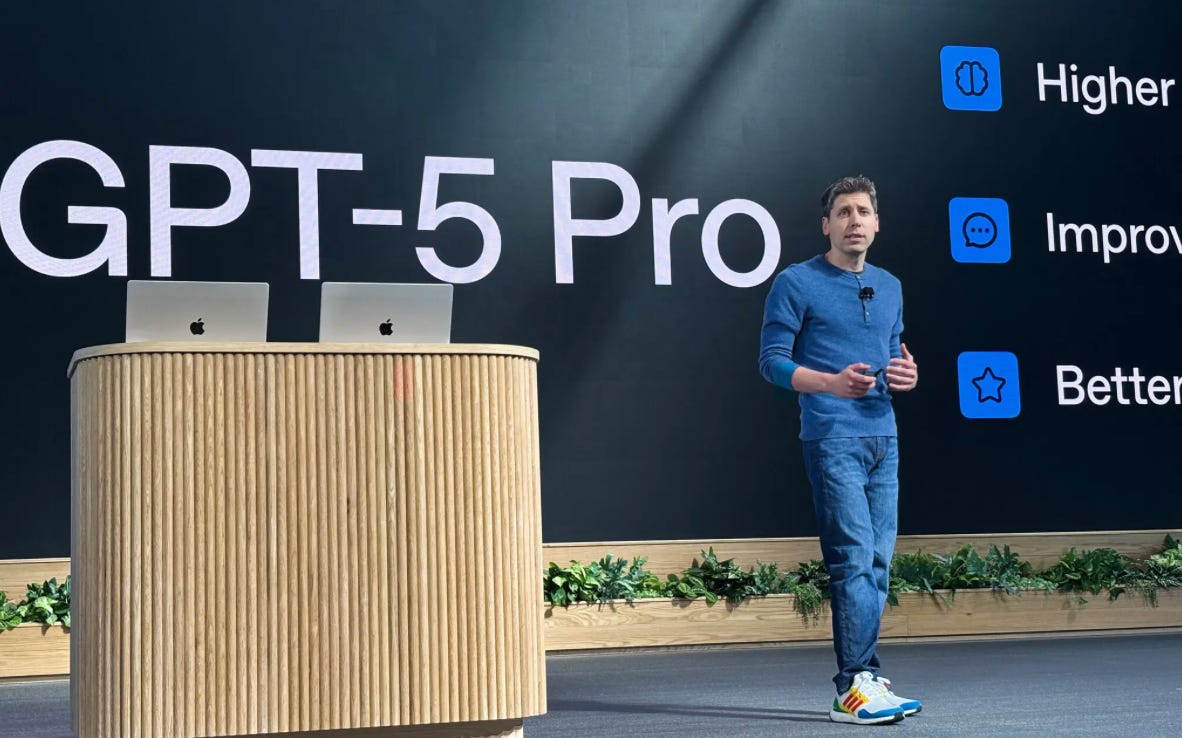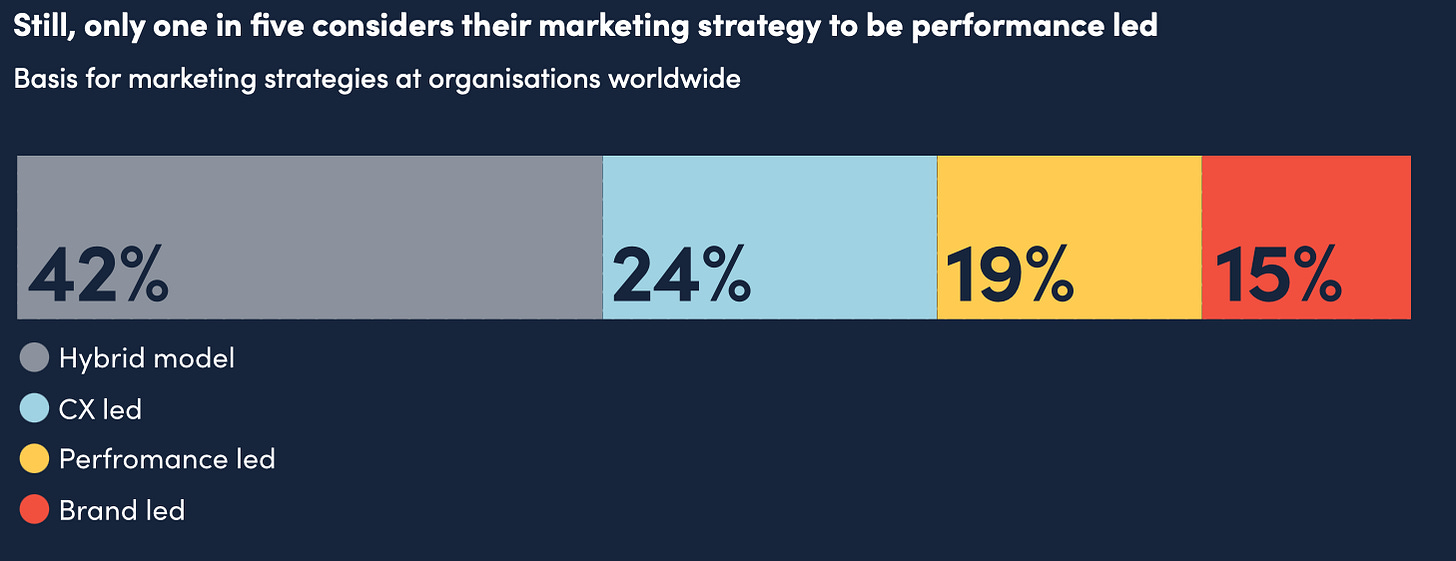Robot wars
In a squabble for dominance, AIs are taking over our browsers and our social media feeds.
Issue № 146 | London, Sunday 26 October 2025
Read on to learn why:
① The interface to information is shifting.
② It’s time to audit your content, tweak your SEO/SEM, and experiment.
③ High fees may be what makes private funds compelling to wealth managers.
④ AI is niching down.
⑤ Marketers need to do a better job of educating CEOs on the power of brand.
⑥ Landlords are using ‘amenity buildings’ to appeal to remote workers.
⑦ Now is not the time for British reserve.
📸 But first, flashback to May when I told you that investment products should be promoted by experts not celebrities. This week, Henry MacLeod, head of digital distribution in the UK & Middle East at BlackRock, disagreed, saying that we should be embracing so-called finfluencers.
What's new
OpenAI unveiled a web browser this week, The New York Times reports.

In short:
“OpenAI on Tuesday unveiled a free web browser that is designed to work closely with the company’s artificial intelligence technologies, including the chatbot ChatGPT. The new browser, called Atlas, is a direct challenge to tech giants like Google, Apple and Microsoft, whose browsers have long dominated the internet.”
“If OpenAI can attract internet users to its new browser, it can push them toward its own online services and more easily gather data that can be used to improve its A.I. technologies. Another well-known A.I. start-up, Perplexity, recently released a browser, called Comet, for similar reasons.”
“The browser does not include a traditional address bar. To visit a website, users must type the address into ChatGPT’s chat window. This essentially removes competing search engines from the process. It also allows OpenAI to directly gather user data that can train future A.I. technologies.”
Why it matters
This story doesn’t matter on its own. But it’s not on its own. Also this week, while more than 800 people - including AI scientists, politicians, celebrities and religious leaders - signed a statement to prevent the creation of ‘superintelligence’, Microsoft integrated Copilot into its own browser and X announced that rather than have an algorithm determine what users see in their feeds, Grok, the platform’s in-house AI model, would be in charge. For the first time, AI now has full control of a major social media platform’s timeline.
① In the short term at least, these new AI browsers aren’t likely to win over many users (having your AI ‘in’ your browser rather than sitting in a window next to it really doesn’t fundamentally change the experience), in the long term the trend is clear: the interface to information is shifting. Being heard on X, for example, will now be about ingratiating yourself with Grok. Good tweeting just became AI prompting. What matters this week then is that both our browsers and our social media feeds are being taken over by AI. And marketers will have to adapt accordingly.
The principles marketers have developed over years to maximise discoverability of their brands on search, to earn the most engagement on people’s social feeds, needs fundamentally rethinking. And fast. These aren’t marginal updates - they represent changes in how your audience will access and act on information and how workflows will get automated.
What to do about it
Take action
② The shifts taking place in information discovery are transformational and marketers will be adapting to them for years. Here are the three places to start:
Audit your content: Itemise your current assets (white papers, blog posts, webinars, case studies) from the perspective: ‘If a browser-based AI assistant offered a summary of our brand and services, what would it pick out?’ Ensure your core value proposition is expressed in concise, structured form (so the AI can easily summarise/quote it) and you embed hooks for deeper exploration. And identify opportunities to create ‘AI-friendly’ formats: e.g., chat-friendly FAQs, modular content units, summaries that feed assistant-middlewares.
Update your SEO/SEM: Review whether your keyword/intent strategy covers conversational queries rather than only search keywords. Ensure structured data (schema.org, open graph) is optimised so AI assistants can parse and reference your content. And test whether you can become a source of truth in your category whose content is surfaced by browser-AI sidebars.
Experiment with pilot programmes: Create a microsite or content piece optimised for browser-AI assistant surfacing (shorter modular content, structured data, ‘ask the assistant’ prompts) and track how it performs vs. traditional content. Measure any shifts in behaviour: Are user sessions shorter but more focused? Are demo bookings coming from queries like ‘assistant recommended this asset’ or ‘we found you via AI-browser sidebar’?
Get help
Two ways I can help you: 1) hire me as a full-time member of your team; or 2) use InMarketing, an advisory service for senior leadership teams in finance and tech.
🔎 Audit 🧭 Strategy 🖋️ Positioning ✅ Planning 🤷🏻 Problem-solving ☎️ Counsel
Top stories
The other articles that are worthy of your time.
FINANCIAL SERVICES
Why everyone is trying to sell you private assets at the moment
③ Private funds’ high fees may be more compelling to wealth managers than diversification or long-term returns.
“In Europe, recent open-ended funds have evolved into the Eltif (European Long-Term Investment Fund), designed to channel the capital of individuals towards long-term projects and companies. In the UK, these are known as LTAFs (long-term asset funds). Both are regulated and are considered part of the ‘democratisation’ of private assets. These funds have a semi-liquid structure, one that usually allows monthly inflows but only quarterly, at best, redemptions.”
“But being big doesn’t necessarily make private groups safe investments. The rapid collapse this month of highly leveraged US auto parts group First Brands, with some $12bn in debt, sent shivers through the leveraged loan and private credit markets. This week, Bank of England governor Andrew Bailey drew parallels with practices before the 2008 financial crisis, telling the House of Lords’ financial services regulation committee that ‘alarm bells’ are ringing over risky lending in the private credit markets.”
“In many respects, retail investors are filling the shoes of those who have already bolted for the exit. Private equity funds in particular have sought new sources of capital as demand from their institutional clients has waned in recent years.”
TECHNOLOGY
OpenAI hires Wall Street bankers to train AI in financial models
④ AI is niching down.

“The firm behind ChatGPT has been recruiting ex-bankers at the likes of JPMorgan and Goldman Sachs for its Mercury project, says Bloomberg. The bankers are paid $150 an hour to write prompts and build financial models for things like restructurings and initial public offerings.”
“To get the gig, they face an interview with an AI chatbot, followed by a test on financial statements, and a modeling test. Once recruited as contractors, participants must create models in Excel and follow industry norms for formatting.”
“OpenAI is one of many firms looking to help Wall Street reduce the heavy manual workload required of investment banking analysts who build models for deals.”
MEDIA & MARKETING
Marketers focus too much on short-term wins – but that’s not all their fault
⑤ Marketers need to do a better job of educating CEOs on the power of brand.

“The majority (57%) of the modern marketing budget goes to performance marketing, according to an Adobe survey of more than 300 marketing leaders worldwide. That share is growing, too. Since last year, 23% of marketing teams have allocated even more budget to performance marketing – that is, to short-term activities that will prop up executives‘ efforts to continually measure their impact.”
“Despite the budget-allocation trends, only 19% of senior marketers say their approach is led by performance. What’s more, although more than two in five (42%) say their strategy is guided by brand, performance and customer considerations, 80% seek to balance long-term, brand equity and short-term performance more effectively.”
“The odds are stacked against them, however. Organisational practices increasingly incentivise short-term performance over long-term value. Take performance reviews: 32% of senior marketers face budget or performance reviews either weekly or monthly and some (4%) are evaluated in real time. It’s impossible to demonstrate the ROI of brand-building efforts over such brief periods, as these initiatives take many months, or even years, to prove their impact. Even the 50% of marketers who are evaluated quarterly may struggle to show the effectiveness of their brand-building activities in these timeframes.”
WILDCARD
Golf simulators and gyms are luring Americans back to the office
⑥ Landlords are using ‘amenity buildings’ to appeal to remote workers.

“An office development in Houston, Wells Fargo Plaza, has an arcade with table football, air hockey and vintage video games. In New York City, 1333 Broadway, in Midtown, has a rooftop bar with cabanas and ‘stunning, unobstructed views of the iconic Empire State Building’.”
“According to Jeff Eckert, of JLL, a consultancy, demand for such ‘amenity space’ has been growing for ten years. But it accelerated during the pandemic. He cites a building in Denver he recently visited that had a grand roof terrace with firepits and a view of the Rocky Mountains, as well as a half-sized basketball court. ‘You walk in and you’re like, Am I in a five-star hotel?’ he says. The goal is to get employees who got used to working from home in their pyjamas to come into the office.”
“Though a fifth of office space in America remains vacant, according to JLL’s estimates, vacancy rates in the fanciest buildings are far smaller. This year, for the first time since 2019, more office space has filled up than emptied across the country. Not every firm wants amenities. Smaller companies with smaller budgets are returning to older ‘B-class offices’. The pickleball courts are in but if the economy slows sharply, the grey cubicles may yet return.”
Off cuts
The stories that almost made this week’s newsletter.
FINANCIAL SERVICES
📉 Lloyds profits plunge 40% on car finance scandal
💹 Banks buy stake in LSEG’s post trade business
👏🏻 Citi appoints CEO as chair of the board
👏🏻 Former NatWest executive David Lindberg appointed HSBC UK boss
👏🏻 State Street Investment Management names Stephen Yeats to UK CEO
TECHNOLOGY
😲 Trump pardons Binance founder Zhao
🎯 Fintech industry takes aim at ‘logic-defying’ banking watchdog
🤑 Revolut just got permission to sell crypto to 450 million Europeans
🤖 Citi AI training ‘fundamental,’ tech leader says
🦾 Lloyds Bank rolls out nearly 30,000 Copilot licences
MEDIA & MARKETING
📰 How The Telegraph is rethinking paywalls, revenue, and SEO
📲 What the TikTok sale means for US digital engagement
🎞️ In focus: Getty and Shutterstock merger gets CMA probe
📊 LinkedIn’s new rules for B2B marketing measurement
🔎 How to earn the click: Navigating Google’s unpredictable search results
The last word
⑦ Lord Mayor Alastair King on why we need a change of attitude:

“It is not just over-regulation that is holding the United Kingdom back: it is our attitude. At a time when rival financial centres like New York are investing and innovating at speed there is no place for the stereotypical British reserve.”
Don’t settle for marketing.
Aspire to InMarketing.
Wishing you an interactive week,
P.S. Like you, I was shocked and intrigued by the jewel heist at Le Louvre last Sunday morning. But, don’t worry, I’ve solved the case.





